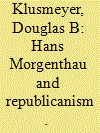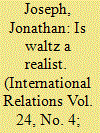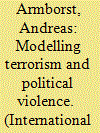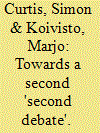| Srl | Item |
| 1 |
ID:
101509


|
|
|
|
|
| Publication |
2010.
|
| Summary/Abstract |
Recent scholarship has called attention to the republican dimension of Hans Morgenthau's approach to politics in the postwar era, but the role republicanism played in his thought remains ambiguous. This essay examines that role, and explores its tensions with other aspects of his understanding of politics. It argues that he expanded and deepened his approach to politics as he developed a republican critique of American domestic politics. However, his conception of international politics remained rooted in the reason-of-state tradition, and evinces little evidence of his increasing engagement with republicanism. In this selective use of republicanism, he left its tensions with other aspects of his thinking unresolved, but this usage also suggests his recognition of the inadequacy of the original formulation of his realist approach. In considering what IR theorists today may learn from republicanism, his example is highly instructive in any effort to reconstruct the foundations of realism.
|
|
|
|
|
|
|
|
|
|
|
|
|
|
|
|
| 2 |
ID:
101508


|
|
|
|
|
| Publication |
2010.
|
| Summary/Abstract |
The dramatic injection of energy into the debate over the importance of nuclear disarmament in recent years presents a historic opportunity to make the world safer from the unacceptable risks posed by its most powerful weapons. We cannot allow this moment to pass. The positive steps taken by President Obama have added crucial momentum to the disarmament and non-proliferation agenda, but we cannot rely on him alone. No one leader, regardless of their vision, can carry such a burden. After the years of nuclear atrophy since the end of the Cold War, a sustained effort is needed at the highest levels to reverse the damage done by successive failures of political leadership. This article outlines the key features of political leadership, explains its importance, examines historical instances of leadership and highlights instances of successful political leadership. In this multi-polar world, it is only through multilateral action that we can achieve a world free of nuclear weapons, and this requires proactive multilateral political leadership.
|
|
|
|
|
|
|
|
|
|
|
|
|
|
|
|
| 3 |
ID:
101517


|
|
|
|
|
| Publication |
2010.
|
| Summary/Abstract |
In the opening chapter of Theory of International Politics Waltz makes an interesting distinction between scientific laws and theory construction. Recent special issues of this journal have suggested that this distinction allows Waltz to be read in different ways - for example, as a scientific realist who conceives of unobservable entities, or as a constructivist interested in how we create models. This contribution argues against both these interpretations by analysing the first chapter of Waltz's book and suggesting that his distinction between theories and law-like statements is fully consistent with mainstream discussions in the philosophy of social science. It argues that Waltz's position still depends on the identification of empirical regularities, something that makes him an empirical realist, but which undermines the claim that he is a scientific realist.
|
|
|
|
|
|
|
|
|
|
|
|
|
|
|
|
| 4 |
ID:
101512


|
|
|
|
|
| Publication |
2010.
|
| Summary/Abstract |
This article introduces some conceptual thoughts to the study of terrorism and provides answers to questions such as: can terrorism be studied like other crime phenomena? What are the conceptual and methodological challenges when framing terrorism as crime or military conflict? What are the epistemological consequences of studying a highly politicized object? What makes terrorist violence different from other forms of political violence such as guerrilla warfare and insurgency? For this purpose, in the first part of the article a review will be conducted to ascertain what criminologists have contributed to the conception of terrorism. In the second part a model of terrorism is elaborated that depicts the crucial parameters of this form of political violence and thereby bypasses some of the existing conceptual difficulties and misconceptions. We learn from the various definitions of terrorism that the singularity of terrorism has something to do with the victim, the purpose and the consequences of violence. Specifically the fact that terrorists are as indifferent to the various targets as they are to the various political consequences of their attack is what distinguishes terrorism from related phenomena of political violence.
|
|
|
|
|
|
|
|
|
|
|
|
|
|
|
|
| 5 |
ID:
101514


|
|
|
|
|
| Publication |
2010.
|
| Summary/Abstract |
This article examines the contemporary disciplinary claims that the 'Second Debate' in international theory was partial and incomplete. Developing the view that the debate exclusively concerned positivist methods, not the status and merits of social scientific inquiry in international relations theory (IR) more broadly, the article advances an understanding of how contemporary 'social scientific' IR has begun to integrate historicist and generalising claims in a single theoretical framework. Moreover, the article seeks to transcend the assumption of incommensurability between scientific and historical frames of inquiry that characterised the idea of scientific inquiry in the Second Debate, and does this through an intellectual history of arguments for a 'science of society'. The article shows how the emergence of non-positivist alternatives entails the development of abstractions and limited generalisations based on 'mechanismic explanation', particularly suitable for the development of middle-range theorising in IR. Overall, we argue that one important implication of the named methodological discussion is the reinforcing of the place of historical sociological analysis at the centre stage of international theory.
|
|
|
|
|
|
|
|
|
|
|
|
|
|
|
|
| 6 |
ID:
101515


|
|
|
|
|
| Publication |
2010.
|
| Summary/Abstract |
Asylum seekers can be considered some of the most vulnerable people in the world, yet this article demonstrates that in advanced industrialized states, exemplified by the UK, they are constructed as a homogeneous collective that threatens state interests. This article examines the construction of asylum seekers as a threat that is evident in British narratives. Building on works by critical security scholars, this article examines the process that led to asylum seekers being portrayed as a threat in the UK. The empirical research focuses on narratives that give insight into sentiments towards asylum seekers in the UK. Government policy, political statements and the mass media are considered. The nature of the threat examined is threefold and takes into account traditional security studies, economic or subsistence security and societal identity security.
|
|
|
|
|
|
|
|
|
|
|
|
|
|
|
|